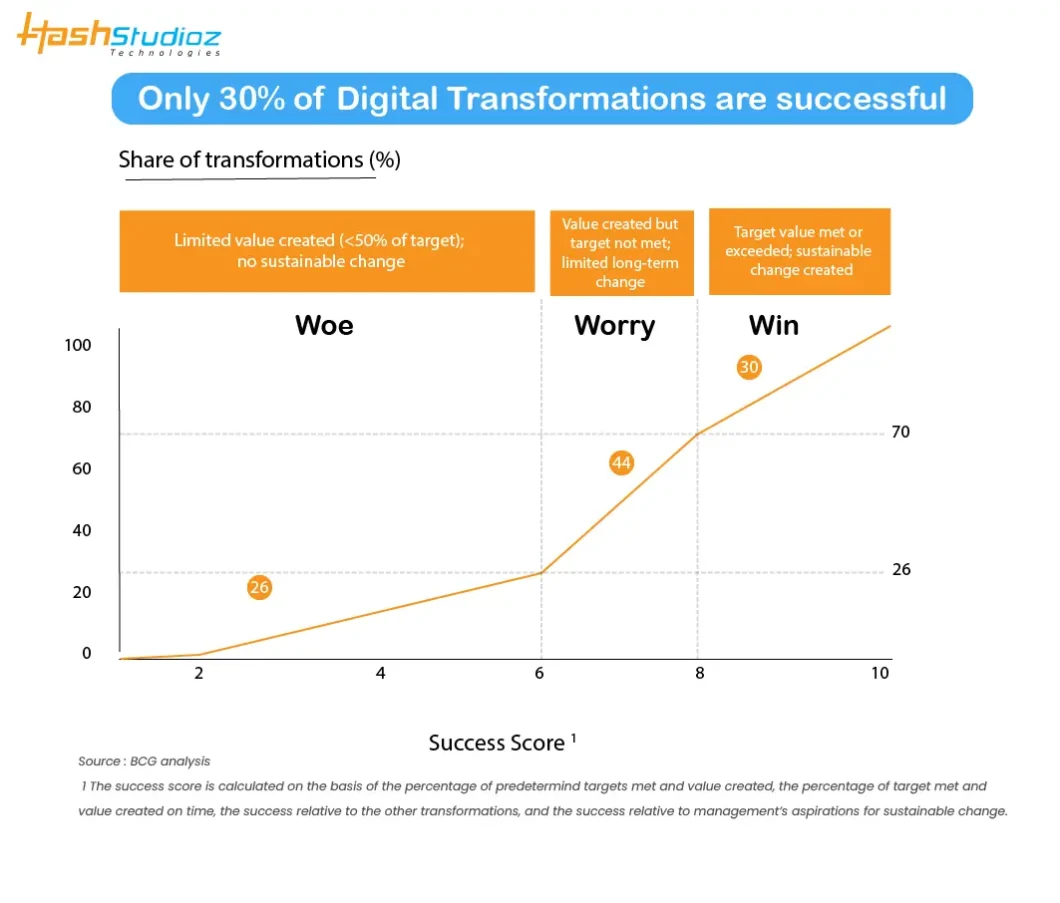Digital transformation has become imperative for organizations to stay competitive and efficient in today’s rapidly evolving business landscape. Despite the alluring promises of enhanced operational efficiency, reduced product development costs and improved product/service quality, the journey is filled with challenges. Success in digital transformation goes beyond simply adopting new technologies. Success depends on skillfully navigating the process and businesses often face various challenges along the way.
In the face of the demand for digital progress, it is necessary to understand that digital transformation extends beyond mere competitiveness. It is a vital survival strategy in today’s business environment. In the pursuit of sustaining a leading position, many organizations find themselves entangled in a complex array of challenges that, if not carefully navigated, can lead to failure.
Research shows that an astonishing 70% of digital transformations either result in failure or fall short of achieving their intended goals.

In this blog post, we will discover the complexities of digital transformation and examine why it is frequently more challenging to implement than it is to talk about.
Table of Contents
- Why Do Businesses Experience Failure in their Digital Transformation Initiatives?
- 1. Adopting Trending Technologies
- 3. Gathering Data & Neglecting its Utilization
- 4. Viewing Digital Transformation as a Continuous Journey
- 5. Ambiguous Goals & Objectives
- 6. Minimizing the Importance of Cultural Shift
- 7. Poor IT Skills
- 8. Disregarding Data
- 9. Lack of Support from Leadership
- 10. Ignoring Customer Needs
- 11. Internal Resistance
- 12. Unattainable Deadlines
- Why Choose HashStudioz to Avoid Digital Transformation Pitfalls?
- Conclusion
Why Do Businesses Experience Failure in their Digital Transformation Initiatives?
According to reports, 70% of digital transformations face challenges not due to a lack of technological expertise but rather due to a deficiency in the wisdom required to navigate the complexities associated with this transformative journey.
In addition to the appeal of advanced technologies, achieving a successful digital transformation requires strategic foresight, expert planning & recognition that it includes a multifaceted initiative. This extends beyond the scope of merely adopting technology. Let’s explore some common pitfalls in strategies for digital transformation.
1. Adopting Trending Technologies
Starting a digital transformation without a well-defined strategy is similar to navigating uncharted waters. Many businesses fall into these pitfalls by utilizing new technologies solely because they are popular or effective for their competitors.
However, blindly following trends can lead to a divergence from the objectives of the organization. The solution? Invest time in creating a strong strategy that suits your specific requirements. This ensures that your digitalization endeavors align with your business goals providing concrete value.
2. Limited Financial Resources
Digital projects frequently face problems due to limited budgets. Adequate preliminary planning, prioritization & recognition of the ongoing nature of digital transformation are important to prevent unexpected expenses and resource depletion.
3. Gathering Data & Neglecting its Utilization
In the world of digital transformation, the significance of data cannot be overstated. However, many organizations gather extensive datasets without fully utilizing their capabilities. It is imperative to build a robust plan rooted in data to sidestep these pitfalls. To avoid encountering difficulties in digital transformation, carefully analyze and transform data into actionable insights. This ensures the optimization of processes, prioritization of business objectives and the facilitation of well-informed decision-making. The true power of digital transformation is realized when data is utilized as a strategic asset.
4. Viewing Digital Transformation as a Continuous Journey
Digital transformation is more similar to a marathon than a sprint. Approaching it as a singular event may lead to confusion and pushback from both employees & customers. Achieving a successful transformation requires ongoing adaptation to the dynamic digital landscape.
Embracing a mindset of ongoing enhancement enables organizations to successfully navigate complexities & avoid potential challenges linked to digital transformation.
5. Ambiguous Goals & Objectives
Digital transformation is prone to failure when goals and key performance indicators (KPIs) are not clearly defined & agreed upon. A carefully articulated strategy originating from leadership and extending throughout the organization guarantees alignment with business goals. Success thrives on clarity. It serves as the foundation for a purposeful digital transformation.

6. Minimizing the Importance of Cultural Shift
The impact of digital transformation extends beyond the domains of C-level executives and IT departments. It involves every individual in the organization. Fostering a culture that promotes open communication and the sharing of knowledge is essential for achieving success. Avoiding a narrow mindset is crucial for a smooth transformation ensuring that every employee understands their role in achieving common goals.
7. Poor IT Skills
Successfully embarking on the digital transformation path requires the appropriate capabilities, tools, and talent. Acknowledging the possible lack of expertise within their internal capabilities, organizations ought to seek external collaborators to provide the necessary skills for a successful digital strategy.
8. Disregarding Data
Companies miss out on significant opportunities when they fail to extract valuable insights from collected data. Effective data management is crucial. Skillfully utilizing data turns it into a driving force for digital initiatives.
9. Lack of Support from Leadership
To achieve a successful digital transformation, the entire organization must adopt digital initiatives requiring enthusiastic backing from senior management. The active involvement, enthusiasm & dedication of leadership play an important role in ensuring the success of the digital transformation journey.
10. Ignoring Customer Needs
Amidst the rapid advancements in technology, businesses frequently neglect the crucial importance of their customers. It is important to comprehend the changing demands of customers. Adopting a customer-centric approach ensures that digital transformation efforts are in harmony with the actual needs of individuals, thereby promoting success.
11. Internal Resistance
Encountering resistance within the organization is inevitable when shifting toward a digital culture. Leadership holds an important position in cultivating a culture that embraces change, emphasizing the reasons for transformation and illustrating a vivid vision of the desired culture aligned with business goals.
12. Unattainable Deadlines
Establishing specific deadlines for an ongoing digital transformation is impractical. Instead, prioritize temporary goals to effectively handle deliverables and sustain a manageable pace, thereby avoiding overwhelming the team.
Why Choose HashStudioz to Avoid Digital Transformation Pitfalls?
Opting for digital transformation represents a crucial decision for any organization & the choice of a suitable partner can have a profound effect on the results. HashStudioz shines as a symbol of excellence, providing extensive experience, expertise & a proven history of delivering exceptional digital and mobile products. Here’s why HashStudioz is the perfect ally in the world of digital transformation:
Seamless Experience in Digital Transformation
With a track record of successfully delivering more than 2,000 digital and mobile products, HashStudioz has made a lasting impact across various industries including logistics, education, e-commerce, finance, wellness & entertainment.
Our extensive expertise in digital transformation resonates strongly, influencing millions of users globally. Regardless of the industry, our flexible strategies and digital transformation services & solutions have consistently propelled digital achievements.
Excellence in Digital Product Engineering
With a remarkable 5+ years of expertise in digital product engineering, HashStudioz proudly features a dedicated team of in-house developers. We are dedicated to more than just achieving excellence. Our goal is to raise your digital product to the highest standard in its class.
Our team of designers and UX/UI experts seamlessly collaborates with skilled programmers, combining ideas & expertise. The collaboration leads to a holistic and inventive strategy for crafting digital solutions that set themselves apart in the competitive market.
Security, Privacy & Ongoing Support
At HashStudioz, we give top priority to the security & privacy of your data. We utilize modern measures to protect every single piece of information ensuring the integrity and confidentiality of your digital assets.
After the initial development phase, we are dedicated to offering continuous support & maintenance services. This guarantees that your digital product will adjust to the evolving requirements of your users ensuring its continual relevance and optimal performance.
In an era where attaining digital success is intricately linked to market leadership, choosing HashStudioz as your partner in the digital transformation journey is a strategic choice. Let’s work together to disrupt the $1 trillion market, empower millions of users & develop digital products that exceed excellence.
Conclusion
In summary, it is crucial to begin the digital business transformation journey to ensure survival in the contemporary business environment. Nevertheless, there are many challenges to be mindful of, ranging from implementing technology without a clear strategy to underestimating the importance of cultural change.
In this blog, we delved into various factors contributing to the challenges companies frequently face, placing particular emphasis on the importance of strategic foresight. Additionally, we pointed out misguided approaches including the pitfalls of replacing entire systems or implementing isolated solutions.

Frequently Asked Questions
1. Why is it important to embrace technology with a clearly defined strategy?
Implementing technology without a well-defined strategy may result in a lack of synchronization with organizational goals. A strong strategy is essential to ensure that digitalization initiatives are in harmony with business goals.
2. How crucial is data within the digital business transformation journey?
Data plays an important role. Strategic collection and utilization of data enhance processes, prioritize business objectives and facilitate well-informed decision-making.

